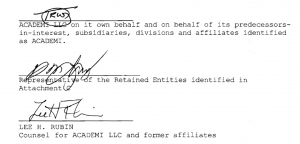Blackwater’s Slap on the Wrist for Gun Smuggling and Arms Trafficking
 Viewed from one perspective the facts that Blackwater has admitted to amount to running guns–precisely the crime that Fast and Furious attempted to combat. Viewed from another perspective, Blackwater’s actions amount to the same kind of thing Viktor Bout is in prison for: making weapons deals with sanctioned entities.
Viewed from one perspective the facts that Blackwater has admitted to amount to running guns–precisely the crime that Fast and Furious attempted to combat. Viewed from another perspective, Blackwater’s actions amount to the same kind of thing Viktor Bout is in prison for: making weapons deals with sanctioned entities.
But Blackwater will suffer no more than a wrist slap for such things: a $7.5 million fine, a third of which can be credited to implementing a compliance system that is substantially already in place, as well as a $42 million Consent Agreement fine it signed two years ago. (It has paid two $6 million installments of the $42 million fine it owes to State Department; even while it continues to get contracts with State)
That doesn’t make the Deferred Prosecution Agreement any less funny.
There are the repeated lists of all the aliases of Blackwater–by my count some 37 companies or subsidiaries. Just in case you needed master list of how many times it has tried to change its identity.
There’s the bragging about Blackwater’s new compliance structure (paid for, presumably, as part of this fine), featuring John Ashcroft (the monitor on one of the most corrupt DPAs ever) and former AIG (AIG?!?!?!) compliance whiz Suzanne Folsom.
There’s the way it says Blackwater can’t charge the government any aspect of its fine (what is left after its credit for compliance infrastructure, that is). Only in DPAs is money not fungible, I guess.
There’s the way they try to guard against Blackwater rebranding again (the DPA is written in the name Academi and invokes Xe) by selling itself to someone else. (There’s apparently an Erik Prince declaration I’m going to have to chase down tomorrow.)
And there’s the way that of those who signed this DPA for Blackwater, only the name of the attorney is included in the text.
Now maybe I shouldn’t be laughing so hard. The DPA implies that the US Attorney in North Carolina’s Eastern District, Thomas Walker, is still investigating. Maybe Erik Prince will go to jail? Ha!
But this DPA is more a case study in the myriad ways corporate entities escape all justice in this day and age than any real accountability for the same kind of actions we impose stiff sentences on others for.
As always, the lesson is if you’re going to commit crimes, do it as a corporation.
